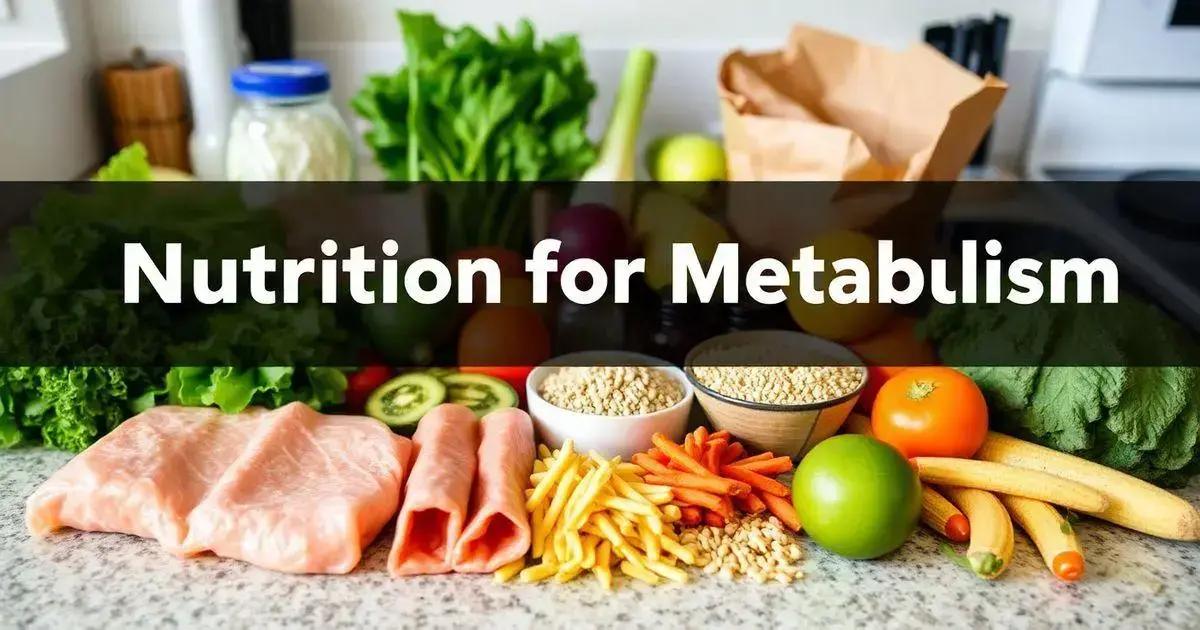To maintain a healthy metabolism after 50, focus on balanced nutrition, regular exercise, adequate sleep, hydration, and stress management. Incorporating lean proteins, whole grains, and healthy fats, along with strength training and cardiovascular activities, can significantly enhance your metabolic rate and overall well-being.
As we age, understanding how to maintain a healthy metabolism becomes crucial, especially after 50. Metabolism affects our energy levels, weight management, and overall well-being. In this article, we will delve into effective strategies to improve and sustain metabolic health in your golden years. From nutrition to exercise, we’ll explore the best practices for enhancing your metabolic rate and embracing a healthier lifestyle.
Understanding Metabolism: Changes After 50

As we age, our bodies undergo various transformations, especially after the age of 50. Understanding these changes in metabolism is key to maintaining a healthy lifestyle.
What is Metabolism?
Metabolism refers to the set of life-sustaining chemical reactions in our bodies. It’s responsible for converting food into energy, building and repairing tissues, and helping maintain essential bodily functions.
Metabolic Changes After 50
After 50, metabolism tends to slow down due to several factors. One major factor is the natural decrease in muscle mass. As we get older, our bodies lose muscle at a rate of about 1% per year after the age of 30. This muscle loss can lead to a lower basal metabolic rate (BMR), making it harder to burn calories.
Hormonal changes, particularly in women during menopause, also impact metabolism. Lower levels of estrogen can lead to increased fat accumulation and changes in how the body processes nutrients.
Other Contributing Factors
Another factor to consider is the decrease in physical activity levels that often occurs with age. Many individuals may become less active due to health issues or lifestyle changes, further contributing to metabolic slowdown.
Aging might also affect the way our bodies respond to insulin, potentially leading to insulin resistance, a condition that can hinder effective metabolism. Nutrition choices become increasingly important as we age to support metabolic health.
Nutrition for a Thriving Metabolism

Good nutrition is key for a thriving metabolism, especially for those over 50. Proper food choices can help fuel your body efficiently. Here are some dietary guidelines to consider.
Consume Lean Proteins
Including lean proteins in your diet is essential. Proteins help build and maintain muscle mass, which is vital for a higher metabolic rate. Sources include chicken, fish, beans, tofu, and low-fat dairy products.
Embrace Whole Grains
Whole grains provide essential energy and nutrients. Foods like brown rice, whole wheat bread, oats, and quinoa can help keep you feeling full longer and boost your metabolism.
Include Healthy Fats
Healthy fats, such as those found in avocados, nuts, seeds, and olive oil, can also be beneficial. They support many body functions, including hormone production, which plays a part in metabolism.
Stay Hydrated
Drinking plenty of water is crucial. It helps with digestion and maintains metabolic processes. Aim for at least eight glasses a day. You can also hydrate with herbal teas or water-rich fruits and vegetables.
Focus on Fiber
Eating enough fiber can help regulate digestion and maintain a healthy weight. Foods rich in fiber include fruits, vegetables, legumes, and whole grains. Fiber keeps you full and supports metabolic health.
Exercise Routines to Kickstart Your Metabolism

Regular exercise is a fantastic way to kickstart your metabolism, especially after the age of 50. Here are some effective routines and activities to consider.
Strength Training
Incorporating strength training into your routine can help maintain and increase muscle mass. Aim for at least two days a week. Use weights, resistance bands, or body-weight exercises such as squats and push-ups. Strength training not only boosts metabolism but also improves bone density and overall strength.
Cardiovascular Exercises
Cardio exercises, like walking, jogging, cycling, or swimming, are great for getting your heart rate up. Aim for at least 150 minutes of moderate-intensity cardio each week. This can help burn calories and improve cardiovascular health, which is vital as you age.
High-Intensity Interval Training (HIIT)
HIIT involves short bursts of intense exercise followed by brief rest periods. This method can be effective for increasing metabolism and burning fat. You could start with 20-30 minutes, two to three times a week, including exercises like sprints, jumping jacks, or burpees.
Flexibility and Balance Exercises
Incorporate flexibility and balance exercises like yoga or tai chi. These can enhance mobility, reduce injury risk, and promote relaxation. Practicing these activities regularly can support your overall fitness and improve your metabolic rate.
Consistency is Key
Make a plan and stick to it. Consistency in your exercise routine is essential for long-term metabolic health. Listen to your body, start slow, and gradually increase the intensity and duration of your workouts.
Lifestyle Habits for Sustaining Metabolism

Several lifestyle habits can significantly help in sustaining a healthy metabolism, especially as you get older. Here are some essential habits to incorporate into your daily life.
Get Enough Sleep
Quality sleep is vital for maintaining a healthy metabolism. Aim for 7 to 9 hours per night. Lack of sleep can disrupt hormone levels, affecting hunger and metabolism.
Manage Stress
Chronic stress can lead to hormonal imbalances that negatively impact metabolism. Practice stress management techniques such as meditation, deep breathing, or yoga to keep stress levels in check.
Eat Smaller, More Frequent Meals
Eating smaller meals throughout the day can help keep your metabolism active. It prevents extreme hunger, which can lead to overeating. Consider having healthy snacks between meals to sustain your energy levels.
Stay Active Throughout the Day
Incorporate more movement into your daily routine. Take short walks, choose stairs over elevators, or stand while working. These small changes can add up and help maintain a higher metabolic rate.
Limit Alcohol Consumption
Excessive alcohol intake can disrupt metabolism and affect liver function. Enjoying alcohol in moderation is recommended for better metabolic health.
Maintaining a Healthy Metabolism After 50
Maintaining a healthy metabolism after 50 is essential for overall well-being and energy levels. By understanding the changes that occur in metabolism, adopting nutritious diets, engaging in consistent exercise, and cultivating positive lifestyle habits, you can effectively support your metabolic health.
As you incorporate these tips into your daily routine, you will not only boost your metabolism but also enhance your quality of life. Remember that each small change adds up and can lead to significant improvements in your health.
Embrace this journey towards a healthier metabolism, and enjoy the benefits of an active, vibrant lifestyle.
FAQ – Frequently Asked Questions on Maintaining a Healthy Metabolism After 50
What dietary changes can I make to support my metabolism after 50?
Incorporating lean proteins, whole grains, healthy fats, and plenty of fruits and vegetables can support your metabolism.
How often should I exercise to boost my metabolism?
Aim for at least 150 minutes of moderate-intensity aerobic exercise each week, along with strength training two days a week.
Why is sleep important for metabolism?
Quality sleep helps regulate hormones that control metabolism, hunger, and overall energy levels.
What role does hydration play in maintaining metabolism?
Staying hydrated is crucial as it helps your body perform metabolic processes efficiently and can aid in weight management.
Can stress affect my metabolism?
Yes, chronic stress can lead to hormonal imbalances that negatively impact your metabolism and weight management.
What are some lifestyle habits that can support my metabolic health?
Developing habits like getting enough sleep, managing stress, eating balanced meals, and staying active can greatly support your metabolic health.













